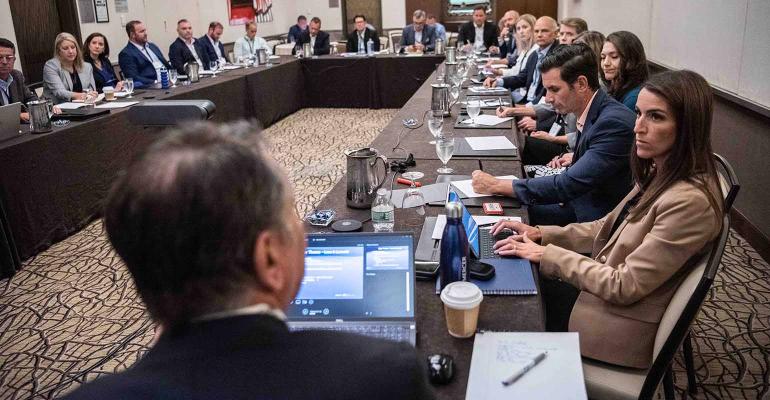Broker/dealers have been living in the convergence of wealth and retirement while most record-keepers and retirement plan advisors are just entering it.
Even so, the leaders of retirement for b/ds that gathered at the fourth annual RPA Broker/Dealer Roundtable and Think Tank held in NYC after the Record-Keeper Roundtable and before the eighth annual WealthManagement.com Industry Awards still struggle to bring their firm’s institutional and retail businesses together.
Main themes around the convergence included how to grow and show their firms the full value of retirement plans as well as access to data. More plan sponsors are asking for financial wellness tools to help workers as retirement plans have become more of a priority, which is a major shift.
Specialists with 50% of their revenue coming from defined contribution plans account for 10% of all advisors with a plan; 35% are intentionalists with DC revenue at 15% to 49% with the rest are accidentalists, or blind squirrels. Though these percentages were similar across difference types of BDs, there were significantly divergent business models on how to best grow the retirement plan business, which included:
- Focus on specialists and funnel business to them—favored by wirehouses
- Encourage and enable generalists—favored by independents
- Foster partnerships between RPAs and wealth advisors—favored by all
View an overview of the major opportunities and challenges facing broker/dealers in the defined contribution market.
Highlights included:
- David Curylo at MassMutual sees his job as simplifying the complex, something Envestnet is trying to do with its acquisition of 401kPlans.com as well as Stephen Daigle’s BidMoni, according to Envestnet's Sean Murray.
- While RPAG’s Jesse Taylor suggested that BDs should create home office specialists, Curylo said his firm is leveraging specialists in the field. UBS’ Mike Griffin noted that he is trying to replicate what specialists do at the home office.
- Jim Doyle at JPMorgan Chase said his firm embraces the nonspecialists and tries to allocate bank referrals sensitive to the diversity of the advisors.
- Hightower’s Scott Smith acknowledged that the 80/20 split between specialists and wealth advisors is the norm, but it can vary depending on how much the referrer wants to do. Partnerships can be tricky if the RPA leaves, especially when splitting fees.
- Brian Brashaw from Advisor Group said fee sharing can even be a challenge within the eight b/ds part of his group while many rely on record-keepers to help with commissions.
- Cambridge’s Annie Messer has seen encouraging results from partnerships between her advisors in the 457(b) and 403(b) markets especially.
- Leveraging wealth clients that own or manage a retirement plan is a challenge, noted Griffin, as is the focus on specialists, which limits distribution with their $33 million average plan size. He also noted that more plan sponsors are asking for help with workers’ financial needs.
- RBC’s Collin Royce said his firm is trying to standardize services models and empower advisors, a sentiment echoed by Cetera’s Adeline Wong, who said the b/d deploys regional growth managers to support generalists.
- While noting that Kestra has a strong home office, Taylor Hammons said senior managers struggle with the apparent low profit margins of retirement plans with 95% held away. Curylo and Shawn Daly of MassMutual have been able to show how revenue from participants in the plans paint a much different picture. Chuck Serveiss from LPL said research at his firm indicated that wealth advisors with a retirement plan are more profitable.
BDs agreed that they need to collaborate on standardizing and getting access to data from record-keepers with three data aggregators in the room, including Morningstar, which has built data pipes to 26 record-keepers, Envestnet and RPAG. Leveraging behavioral finance even more and bringing wealthtech into the DC market by showing what problems their peers were solving were other ways to share.
They asked WealthManagement.com to highlight the opportunities for wealth advisors with DC plans and perhaps extend the LPL research to show how advisors that embrace convergence are more profitable. Expanding the Wealthies to include more providers that support RPAs and wealth advisors that are helping DC participants was also suggested.
It was a robust and lively discussion by a group whose wealth management capabilities are far ahead of RPA specialist firms but struggle to get resources within their own firms as the convergence of retail and institutional worlds collides.
Fred Barstein is founder and CEO of TRAU, TPSU and 401kTV.




